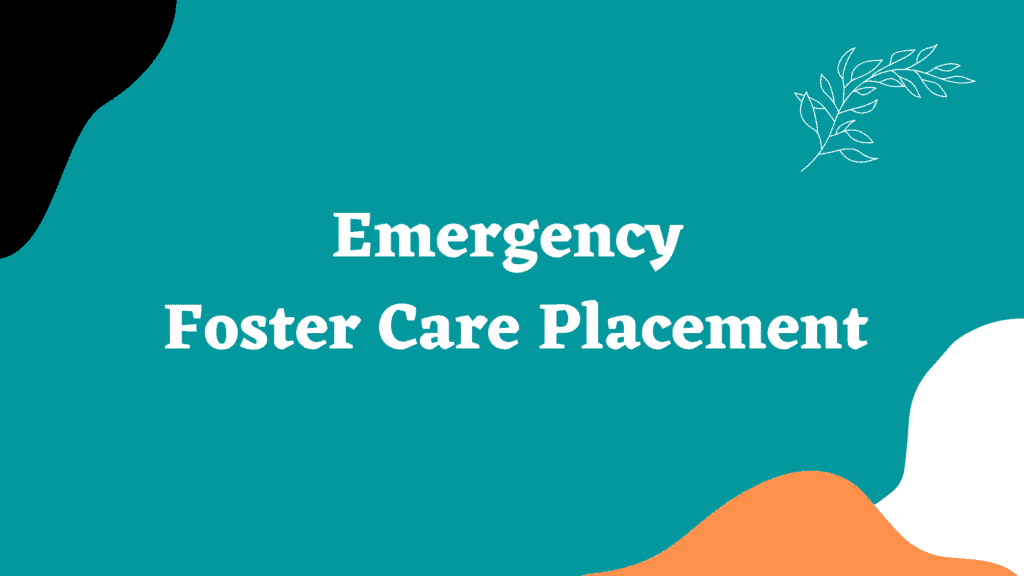Over the last couple of years, emergency foster care has been on the rise generally due to various reasons which narrow down to family issues. Even with this being the case, a certain percentage of people do not have the full picture of emergency foster care placement.
So what exactly is Emergency foster care placement? To keep it simple, emergency foster care placement is a temporary arrangement in which a child is placed in a foster home on a short-term basis, often in response to a crisis or emergency situation. This type of placement can occur when a child’s parents or guardians are unable to care for them due to circumstances such as illness, hospitalization, arrest, or other unforeseen events. In such cases, a child is removed from the biological or current home as soon as practicable. This means that the normal planning or process for child removal from foster care is not done.
The aim of emergency foster care is to provide a safe and supportive environment for the child while the parent or guardian works to resolve the crisis and regain custody. Emergency foster care placements are typically made through a government or social service agency and are overseen by a caseworker who works with the child and the foster family to ensure the best possible outcome for all parties involved.
How is Emergency Foster Care Placement Done
This type of foster care placement, like other types of foster care placements is typically coordinated through a government or social service agency, such as a child welfare agency or a department of social services. When a child is in need of emergency foster care, the agency will work to find an appropriate foster home for the child as quickly as possible.
The process for emergency foster care placement varies depending on the circumstances and the agency involved. In general, it involves the following steps:
- Referral: The agency is notified of a child in need of emergency foster care, either through a report from a concerned individual or through their own investigation.
- Assessment: The agency assesses the child’s needs and determines if emergency foster care is the appropriate solution.
- Placement: The agency then works to find an appropriate foster home for the child, taking into account the child’s age, gender, cultural background, and any special needs.
- Matching: In this step, the child is matched with a suitable foster family while taking into account the family’s availability, experience, and the child’s needs.
- Placement and supervision: The child is placed in the foster home and the agency provides ongoing supervision and support to ensure safety and well-being.

Reasons for Emergency Foster Care Placement
There are many different reasons why a child may need emergency foster care placement. Some of the common ones are:
- Parental illness or hospitalization: If a child’s parent or guardian becomes seriously ill or is hospitalized, they may be unable to care for the child and the child may need to be placed in foster care on a temporary basis.
- Parental arrest or incarceration: If a child’s parent or guardian is arrested or incarcerated, the child may need to be placed in foster care until the parent is released or until alternative arrangements are made.
- Domestic violence: If a child is in danger due to domestic violence in the home, they may be placed in foster care for their own safety.
- Substance abuse: If a child’s parent or guardian is struggling with substance abuse, the child may be at risk and may need to be placed in foster care until the parent can get the help they need.
- Neglect: If a child is not being adequately cared for by their parent or guardian, they may need to be placed in foster care to ensure their basic needs are being met.
- Natural disasters: In the event of a natural disaster, such as a hurricane or earthquake, children may need to be placed in foster care if their parents are unable to care for them because of the disaster.
Benefits of Emergency Foster Care Placement
It’s undoubtedly that emergency foster care placement provides many benefits to foster children who are unable to remain in their own homes because of a crisis or emergency situation. Some of the potential benefits of emergency foster care placement are:
- Safety: Emergency foster care placement provides a safe and supportive environment for children who are at risk due to neglect, abuse, domestic violence, or other dangerous circumstances.
- Stability: Emergency foster care provides children with a stable and nurturing environment during a time of crisis or upheaval in their lives.
- Support: Foster families provide children with emotional and practical support during difficult times, helping them to cope with the challenges they are facing.
- Development: Foster families help children to continue to grow and develop during a time of crisis, providing them with opportunities to learn and thrive.
- Reunification: Emergency foster care placement provides children with the support they need while their parents or guardians work to resolve the crisis and regain custody. This can help to facilitate reunification and ensure that children are able to return to their own families as soon as possible.
Related: What Can Disqualify You from Becoming a Foster Parent
Disadvantages of Emergency Foster Care Placement
While emergency foster care placement can provide many benefits to children who are unable to remain in their own homes because of an emergency situation, it is also associated with some disadvantages. Some of these disadvantages are:
- Separation from family: Children are separated from their parents or other family members when they are placed in foster care, which can be difficult and traumatic for both the child and their family.
- Loss of control: Children may feel a loss of control over their lives when they are placed in foster care, as they are often unable to make decisions about their own care and well-being.
- Loss of familiar surroundings: Children may feel upset and confused when they are removed from their familiar surroundings and placed in a new environment.
- Difficulty adjusting: Children may face difficulties in adjusting to new surroundings and may experience feelings of homesickness, anxiety, or sadness.
- Lack of permanency: Emergency foster care placement is meant to be a temporary solution, and children may not have a sense of permanency or stability while in care.
Effects of Emergency Foster Care Placement on Child Development
The effects of emergency foster care placement on a child’s development vary depending on a number of factors. These factors include the length of time the child spends in care, the stability of the foster care environment, and the child’s individual characteristics. The common potential effects of emergency foster care placement on child development are:
- Separation and loss: Children experience feelings of separation and loss when they are placed in foster care, which can impact their emotional and social development.
- Stress and anxiety: The experience of being placed in foster care can be stressful and anxiety-provoking for children, which can affect their mental health and overall well-being.
- Developmental delays: Children who spend extended periods of time in foster care may experience delays in their physical, cognitive, and social-emotional development. Children who are regularly moved from one foster home to another are not adequately nurtured and stimulated in their early years and may experience delays in their development. Also, children who have experienced trauma, such as abuse or neglect, may be at increased risk for developmental delays.
- Attachment issues: Children who experience multiple placements or who have difficulty forming attachments with their foster caregivers may have difficulty developing healthy relationships in the future.
- Resilience: Some children may develop resilience and coping skills because of their experiences in foster care, which can help them to adapt to new situations and challenges in the future.

How Long Does Emergency Foster Care Placement Last
The length of time that emergency foster care placement lasts is dependent on the specific circumstances and the needs of the child. In general, emergency foster care placement is meant to be a temporary solution as the objective is to reunite the child with their parents or guardians as soon as possible.
In many cases, emergency foster care placements last only a few days or weeks, as the parent or guardian works to resolve the crisis and regain custody of the child. However, in some cases, emergency foster care placements may last longer if the parent or guardian is unable to resolve the crisis within a short period of time. In some rare cases, it can last a few hours (less than a day).
The length of time that a child spends in emergency foster care will also be determined by the agency overseeing the placement, taking into account the child’s needs and best interests of the child. The agency works with the child and the parent or guardian to develop a plan for the child’s care and will review the placement periodically to ensure that it is still in the best interests of the child.
Related: Ending Foster Care Placement
Responsibilities of an Emergency Carer
In the foster care system, emergency foster carers play a critical role in providing a safe and supportive environment for children who are unable to remain in their own homes because of an emergency situation. Some of the key responsibilities of an emergency foster carer are:
- Providing a safe and nurturing home environment: An emergency foster carer is responsible for ensuring that the foster child is safe and well cared for in their home. This may include providing meals, helping with homework, and ensuring that the child’s basic needs are met during the period the child is under their care.
- Maintaining contact with the child’s family: Emergency foster carers may be asked to maintain contact with the child’s family, if appropriate, to help the child stay connected to their loved ones.
- Working with the child welfare agency: Emergency foster carers are required to work with the child welfare agency overseeing the placement to ensure that the child’s needs are being met and to help facilitate reunification with the child’s family.
- Providing support and guidance: Emergency foster carers are required to provide emotional support and guidance to the child, helping them to cope with the challenges they are facing and to feel loved and supported.
- Maintaining confidentiality: Emergency foster carers are also required to maintain confidentiality about the child’s situation and the details of their placement, as required by law.
Qualities of a Good Emergency Foster Carer
There are a number of qualities that can make an emergency foster carer effective and well-suited to this role. Some of the qualities of a good emergency foster carer and which most foster care agencies look for include:
- Compassion: Having a deep sense of compassion and being able to provide emotional support and understanding to the child in their care.
- Patience: Emergency foster carers need to have patience and be able to handle difficult or challenging situations with calmness and understanding.
- Flexibility: The unpredictability of emergency foster care placements and emergency foster carers need to be able to adapt to changing circumstances.

- Resilience: Emergency foster carers need to be able to cope with the challenges and stresses of this role and be able to bounce back from difficult situations.
- Good communication skills: Communication is key in fostering parenting in general. As an emergency foster carer, you should be able to communicate effectively with the child, their family, and the agency overseeing the placement.
- Cultural sensitivity: Emergency foster carers need to be culturally sensitive and able to understand and respect the child’s cultural background and needs.
- Commitment: Emergency foster carers need to be committed to the well-being of the child and to working with the agency and the child’s family to ensure the best possible outcome.
Factors Foster Care Agencies Consider Before Emergency Foster Care Placement
When deciding whether to place a child in emergency foster care, foster care agencies consider a number of factors to ensure that the placement is in the best interests of the child. Some of these factors are:
- The child’s safety: The primary concern of a foster care agency is a foster child’s safety and well-being. If the child is in danger due to neglect, abuse, domestic violence, or other dangerous circumstances, the agency may decide that emergency foster care placement is necessary.
- The child’s needs: A foster care agency considers the child’s individual needs, including their age, gender, cultural background, and any special needs. The agency will try to find a foster home that is best suited to meet the child’s needs.
- The availability of foster homes: The agency considers the availability of suitable foster homes in the area and will try to find a home that is able to take in the child on a short-term basis.
- The child’s family: The agency also considers the child’s family situation and will try to find a foster home that is able to maintain contact with the child’s family, if appropriate.
- The child’s wishes: Also, the agency considers the child’s wishes and preferences, if the child is old enough to express them.
Final Thoughts
Emergency foster care placement can be an important resource for children who are unable to remain in their own homes due to a crisis or emergency situation. It can provide a safe and supportive environment for children who are at risk due to neglect, abuse, domestic violence, or other dangerous circumstances.
While emergency foster care placement can have some disadvantages, such as separation from family and a lack of permanency, it can also provide children with many benefits. Foster families can provide children with emotional and practical support during difficult times, helping them to cope with the challenges they are facing. This form of placement can also provide children with the opportunity to continue to grow and develop during a time of crisis and can help to facilitate reunification with their families.
Overall, emergency foster care placement can be an important resource for children and families in crisis and can help to ensure that children are able to grow and thrive in a safe and supportive environment.







